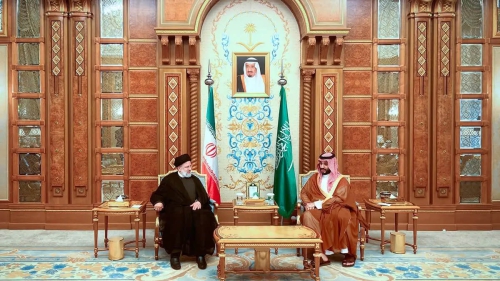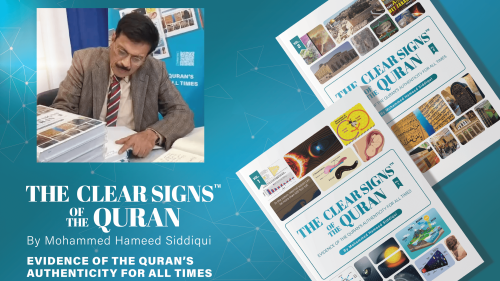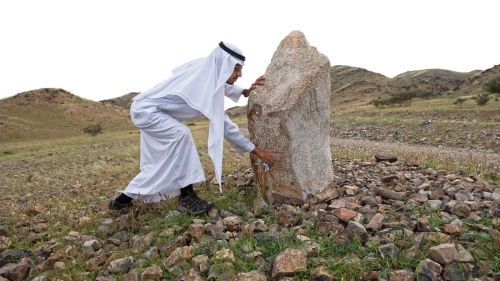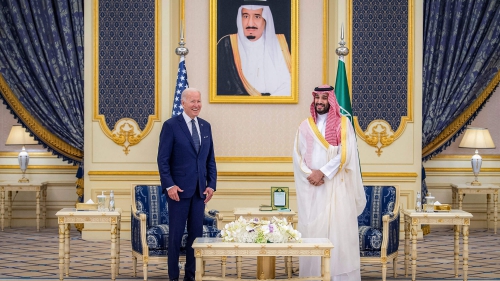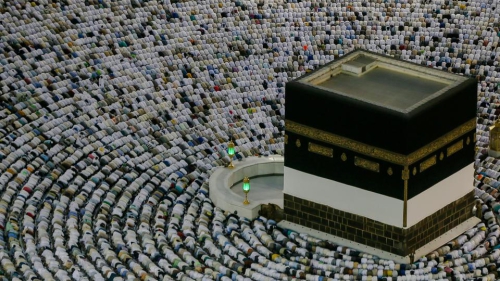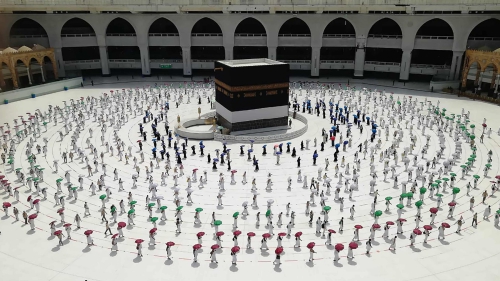Coaches, contractors and US-Arab relations
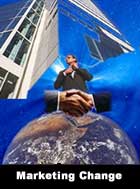 |
As a child growing up in Saudi Arabia in the 80s, the following joke would often be told: "Did you hear that the Kingdom finally decided to go to war against Israel? Really? Yeah, the Koreans got the contract."
The joke was sure to elicit a chuckle. Yet, while the absurdity of government contracting out a war contract is clear, many find it natural that a government would contract out "a public relations campaign" to an advertising agency in a foreign country.
America recently did it: U.S. Undersecretary of State for Public Diplomacy Charlotte Beers contracted out to Madison Avenue advertising agencies, the making of movies about Muslim life in America to show on Arab television stations. Saudi Arabia, for the anniversary of 9-11 also hired a Madison Avenue firm to produce commercials on the history of Saudi Arabia.
Both ventures were flops. Why? First, naked manipulation usually fails; the public can often see right through it. Second, the problem with American perceptions of the Arab world is not with "public opinion"-indeed, public opinion matters little in the formulation of U.S. foreign policy. The problem is that the top American "opinion leaders"-say ten thousand of them-like Members of Congress, their key staffers, the editorial boards of newspapers have not engaged in truly substantive dialog with their Arab counterparts. This is what's missing from the equation.
What's the answer? The Arab World needs to stop hiring "contractors" in the form of advertising agencies, and start hiring advisors who understand the political and media process in America. Arab countries cannot hire advertising agencies to do the job for them-such efforts, are doomed to fail. The only way to truly change the hearts and minds of thousands key political leaders thousands of miles away, is to use one's own hearts and minds to get to them.
That means that in order to be successful in America, countries across the Arab World must unleash thousands of their own young diplomats in training-students, journalists and actual diplomats-to embrace America.
Arab countries invest plenty in coaches for their soccer teams to try to succeed on the world stage. The coaches create exercise and training programs, study opponent tactics, and try to guide the teams to success. But the national players still have to sweat, kick dribble, and learn to work together in order to succeed at the game.
For countries to succeed in their national relationship with America, their players (the educated and political classes) must do all the work, while the coaches (those with experience) provide the guidance.
And to be successful, the Arab countries first need to recognize that it must start hiring coaches and stop hiring contractors. Second, Arab governments must realize that they cannot do all the work themselves. They must unleash the creative talent of their political elite to travel to embrace America directly themselves.
As one of the few Arab-Americans at a senior level on Al Gore's presidential campaign, and an economist who spends half is life working in American politics and half his time working on grassroots development in the Arab World, I recently went on a tour of nine Arab countries (min al moheet ila al khaleej) stretching from Morocco to Oman and with political philosophies ranging from Syria to Saudi Arabia.
The goal was to lead discussions-with students, with journalists and with senior leaders in ministries-about the Arab relationship with America, and what can and should be done to change that relationship.
Reactions varied to my advice. Some political leaders in the Arab World were perplexed about why good conversations with Colin Powell and George Bush did not translate into policy change. Other Arab leaders talked fondly their college days in America where they had "great relations with American college students" and wondered why these relationships with "regular Americans" didn't translate into a more positive U.S. policy in the Arab World. My response was that relations at top-Bush and Powell-and relationships at the bottom-with regular college students-matter little, if the thousands of American political upper-middle classes are ignored.
Some were skeptical. And these were usually more senior political leaders. Those who saw the value in guided upper-mid level person-to-person contacts were usually younger people involved in politics or even college students who were only beginning to learn about how America operates.
The fact that those in power were less likely to buy into the "coaching" ideology might be cause for pessimism about the future of U.S.-Arab relations, but the fact that the vast majority of the Arab World's 300 million people is under the age of 30 should make us all optimistic that future Arab leaders may seek to unleash the creativity of their best and brightest to change hearts and minds in America. Let's hope America's future leaders learn from their mistakes and that hearts and minds in the Arab World can't be changed through advertising either, but instead require direct face-to-face meetings and genuine dialog.
Hady Amr was the national director of ethnic American outreach for Al Gore's presidential campaign. He is currently an independent consultant and can be reached at [email protected]. He wrote this commentary for The Daily Star
Related Suggestions
I'm afraid you don't see it correctly. I spent maybe 15 minutes a day writing for iviews. Not every day. I studied Islam some 20 years back, and I left it behind me. I'm not curious at all about it, neither am I afraid of anything. I'm not in a cocoon: I'm married, have four children, an enterprise, and a quite clear mind. I know very well what I am doing, here and elsewhere, and I don't care being properly understood.
Don't try to judge grown-up people by the few messages you see on a forum. They form a very narrow picture, you probably don't see all published messages from me, and not all the messages I send get published.
Take care.
Alain,
I think you are spending a lot of you time on iviews reading up a various articles about Islam and Muslims.
I honestly think you are interested in Islam on a sub-conscious level - although currently in a negative and apprehensive way - and I think you care a lot about what Muslims think, for you are trying to sell your opinion to them, in a forum that you think a lot of Muslims would read.
You are curious but in a half-hearted way, you want to find out the truth, but are afraid of it, even if you did at least initially you would be too scared to acknowledge it because it would negate what you have been thinking all along and throw out your convictions.
If you want to really find out the Truth about Islam, you need to read the Quran and Sunnah with an open mind. I challenge you to do it truthfully - the rewards are going to be immense. You are going to find out the reality and stop chasing the shadows - that have been created by the biased western media.
From what you have written I see a highly confused mind and heart in turmoil that seems to acts as though all is well and the problem is somehow clear and the answer readily available to it(your mind).
Come out of your cocoon, take off your blinders and read and use your rationality, but suspend your pre-conceived biases and skewed judgements for a while.
This is not an attempt to find fault with you, but just a suggestion that I think you need to try out to achieve inner peace.
Remove the stereotypes of Muslims you have in your mind. There are good Muslims and bad Muslims just like there are good Christians and bad Christians and there are good and bad in all of humanity - that's beside the point if you want to know why you were born as were all of us, what is going to happen to you after you die and what is the purpose of your life and about the existence of God then you need to read the Quran and Sunnah but with a open mind and hear
It would serve him well to turn back the pages of History and see for himself that the Arabs were at the height of development and progress when they wholly adopted Islam and Islamic rule and were on the decline as soon as they chose to move away from it.
The Islamic world was the front-runner to the Renaissance in Europe and today's scientific advancements, for when Europe was in the dark ages in the middle of the last millenium - it was Islamic physicians, scientists, writers, historians and Map makers and Geographers who were making prodigious contributions to the world.
Today's problem of Arabs is a matter of trying out various models of governance and adapting half-heartedly the western model, besides looking at their advancement more from a racial perspective than from an Islamic perspective.
Hence the whole premise of trying to please the U.S. - which is perceived by some as the model for success(at least in the last 50 or so years) - thereby being able to reclaim their past glory is a totally wrong one.
Success in this life and most importantly in the next lies in pleasing Allah by following Islam in every aspect of our lives.
In order to treat a problem effectively it would be best to treat the root cause and not the symptom. The Arabs should introspect, should learn the lessons of history and move away from narrow race based nationalistic cause towards a more inclusive Islamic cause in order to overcome the humiliation and hopelessness of the current situation.
The Islamic cause is not just for the Muslim people of today, it is also for the Muslims of tomorrow - the new generations and the new Muslims - and can only be furthered by adopting Islamic in it's entirety and following the Sunnah of the Last Prophet(Salallahu Alaihi Wasalam).
Which Islam do Muslims want? Their money, at least, seems to point towards fundamentalism. And, in democracies, money can help create strong lobbies. A tract was recently distributed in Paris's headquarter of the UOF (Union of Islamic organizations of France) saying (my translation) "Democracies are totally ineffective in maintaining a number of norms necessary for the moral sanity of populations and in preventing drifts and social disorder." Quite clearly, the Islamic movement tries to contest the basic tenets of democracy and refuses to accept its rules as soon as it feels it can make a point.
I really think that most moderate Muslims are sincere, but I am afraid they are wrong in their premises. Islam has it in its blood: it does strive to conquer the world.








